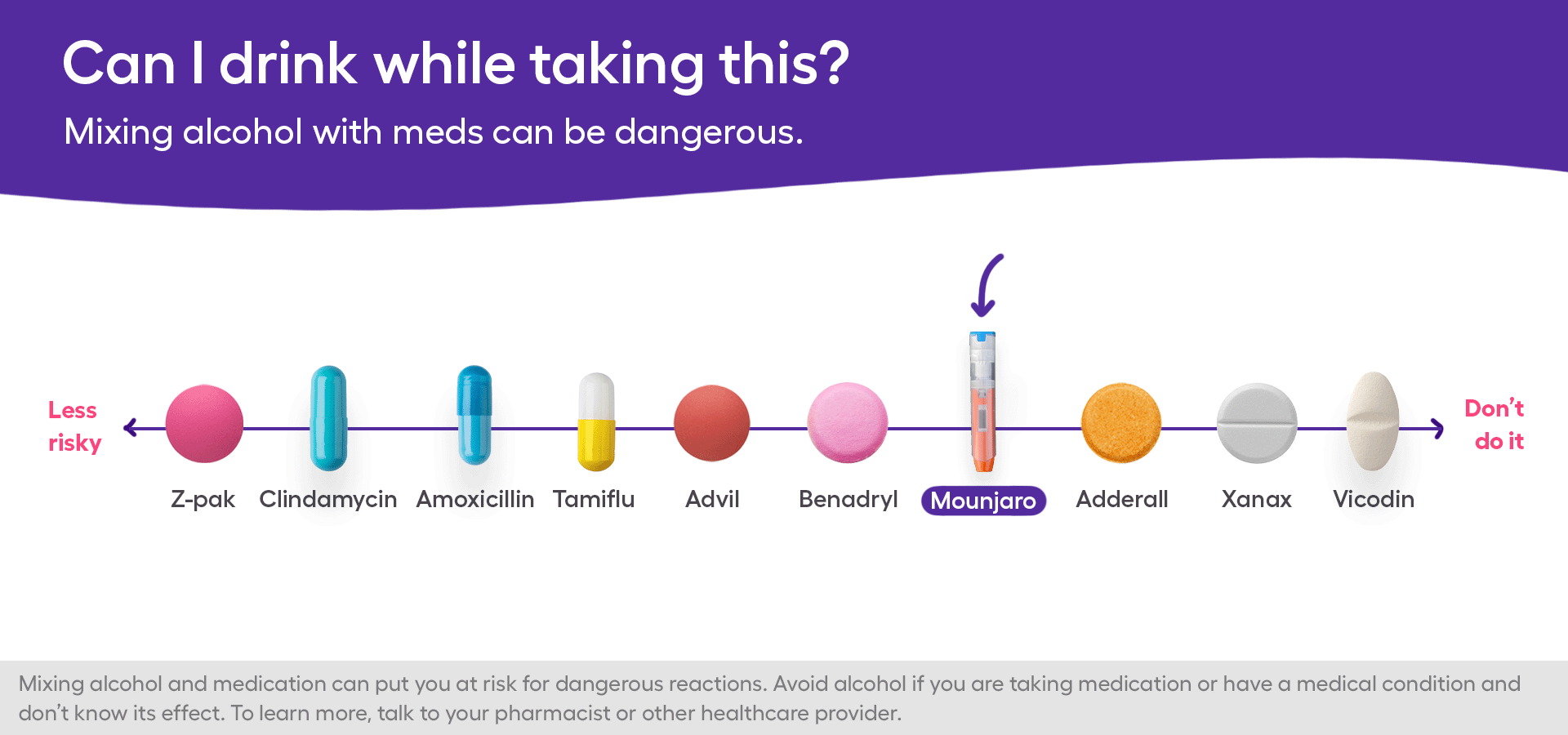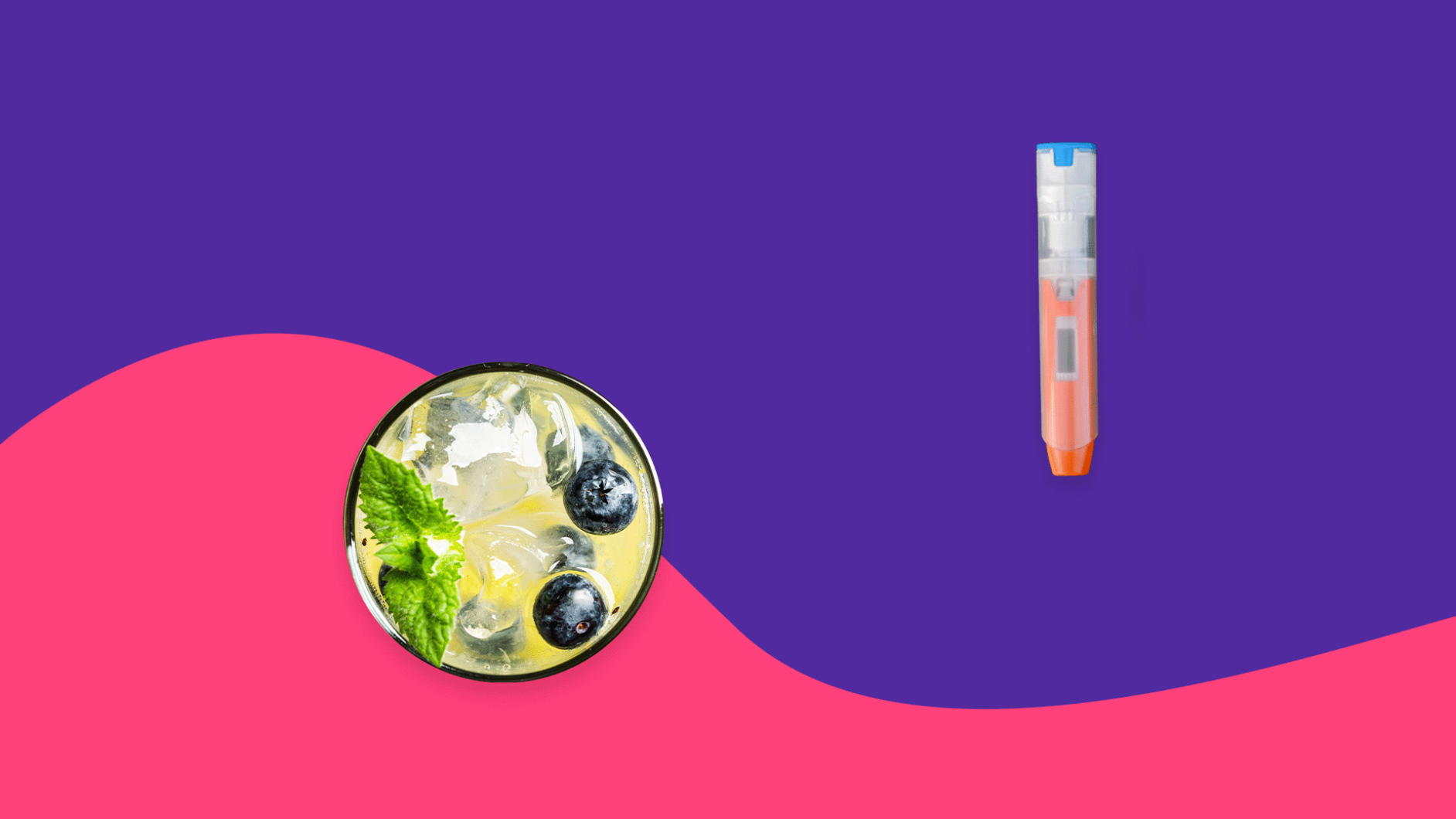Similar to Ozempic, Mounjaro (tirzepatide) is a medication approved to treat Type 2 diabetes. It is prescribed alongside exercise and a balanced diet to manage high blood sugar levels. After its approval in 2022, healthcare providers also prescribed Mounjaro off-label for weight loss. When living with diabetes or trying to lose weight, there are special considerations around alcohol—how it affects your blood sugar and your waistline. If you’re taking this medication, you might wonder, is it safe to mix Mounjaro and alcohol?
In general, it’s not recommended to take Mounjaro with alcohol due to the potential risk of increased side effects and other problems—namely how alcohol can affect glucose (blood sugar) levels and potentially lead to complications when combined with Mounjaro.
Continue reading to learn more about what happens if you combine alcohol and Mounjaro, the potential risks, and how much alcohol may be safe to drink.
What is Mounjaro?
Mounjaro (tirzepatide) is a relatively new brand-name medication prescribed for Type 2 diabetes. As a subcutaneous injection, Mounjaro is administered once weekly into the stomach area, upper leg, or upper arm. It is recommended to be used along with an exercise and meal plan.
Mounjaro is in a new class of drugs called dual glucose-dependent insulinotropic polypeptide (GIP) and glucagon-like peptide-1 (GLP-1) receptor agonists. It works by increasing insulin production and stopping the liver from producing excess sugar, among other actions. Like similar drugs such as Trulicity (dulaglutide) and Wegovy/Ozempic (semaglutide), Mounjaro helps manage blood sugar levels and decrease the risk of diabetes complications like nerve damage (diabetic neuropathy) and heart disease.
Although the FDA has not approved Mounjaro for weight loss, clinical trials have shown that Mounjaro is a promising weight-loss drug for people with obesity. The manufacturer, Eli Lily, is expected to apply for FDA approval for this use in 2023. Mounjaro is not approved to treat Type 1 diabetes.
Mounjaro and alcohol consumption
A Mounjaro interaction with alcohol is possible, which can lead to increased side effects and other problems. Drinking alcohol in large amounts while on Mounjaro may increase the risk of serious side effects. As such, it is advised against combining Mounjaro and alcohol.
For some people, drinking in moderation while using Mounjaro may not cause serious side effects. However, it’s best to check with a healthcare provider before combining the two. Drinking in moderation means limiting alcohol intake to no more than two drinks per day for men or more than one drink per day for women.
Keep in mind that Mounjaro is injected once weekly because the medication stays in your system for around one week. Just because you’re not drinking on the day you took the injection doesn’t mean it’s completely safe to drink alcohol.

Side effects of Mounjaro and alcohol
While Mounjaro is generally well-tolerated by most individuals, it’s important to be aware of possible side effects when taking this medication. Some side effects may be mild and temporary, especially when starting treatment. Other side effects can be serious and require medical attention.
The most common side effects of Mounjaro include:
- Nausea
- Vomiting
- Diarrhea
- Constipation
- Decreased appetite
- Abdominal pain
The most serious side effects of Mounjaro include:
- Inflammation of the pancreas (pancreatitis)
- Severe allergic reactions
- Low blood sugar (hypoglycemia)
- Kidney problems, including kidney failure
- Vision problems
- Gallbladder problems
- Possible increased risk of thyroid cancer, especially in people with a personal or family history of thyroid tumors or multiple endocrine neoplasia syndrome type 2 (MEN 2)
The effects of a Mounjaro and alcohol interaction
Some of the side effects of Mounjaro can overlap with those of alcohol. For example, alcohol may worsen certain side effects, such as an upset stomach, nausea, and indigestion. These side effects may be especially worse after drinking large amounts of alcohol while using high doses of Mounjaro.
Another important aspect of mixing alcohol and Mounjaro is the potential risk of hypoglycemia. Drinking alcohol can increase the risk of hypoglycemia while taking Mounjaro. In addition, alcohol can mask the signs and symptoms of hypoglycemia, such as a fast heartbeat, sweating, dizziness, weakness, and confusion. Additionally, if you’re taking Mounjaro for weight loss, drinking lots of empty calories can counteract your weight-loss goals.
People with a history of chronic alcohol use or alcohol use disorder may need to use Mounjaro with caution. Although Mounjaro isn’t known to cause liver injury, heavy alcohol use is linked to liver problems. It’s important to consult a healthcare provider before considering drinking alcohol with Mounjaro.
Can you drink alcohol while taking other diabetes medications?
Alcohol can negatively interact with some diabetes medications, leading to side effects or serious complications. Examples of diabetes medications that alcohol can interact with include the following.
Insulin
It’s important for people with diabetes who take insulin to monitor their blood sugar levels closely and avoid consuming large amounts of alcohol. Alcohol can increase the risk of hypoglycemia when taken alongside insulin, which may lead to symptoms such as dizziness, confusion, and even loss of consciousness.
Sulfonylureas
Combining sulfonylureas with alcohol can increase the risk of hypoglycemia because both sulfonylureas and alcohol can decrease blood sugar levels. Sulfonylureas include Amaryl (glimepiride), DiaBeta (glyburide), and Glucotrol (glipizide).
Metformin
Alcohol can increase the effects of metformin on lactate levels, which can lead to an increased risk of lactic acidosis. Lactic acidosis is a rare but serious side effect of metformin that can cause symptoms such as muscle pain, weakness, and rapid breathing. In addition, drinking alcohol and taking metformin could lead to an increased risk of hypoglycemia.
Thiazolidinediones
Alcohol consumption can increase the risk of liver damage when taken alongside thiazolidinediones, a class of diabetes medications that improve insulin sensitivity. People who take thiazolidinediones, such as Actos (pioglitazone) and Avandia (rosiglitazone), should avoid consuming large amounts of alcohol and monitor their liver function with a healthcare provider.
People who use Mounjaro may also be taking other medications as part of their diabetes treatment plan. Therefore, it’s important to understand these potential interactions before consuming any amount of alcohol.
Alcohol and blood sugar levels
The main concern with alcohol and diabetes treatment is the potential risk of hypoglycemia. Alcohol can decrease blood sugar levels, which can lead to low blood sugar levels, especially when consumed when using a diabetes medication like Mounjaro. Hypoglycemia can be serious and life-threatening if left untreated.
Although the most common precaution against drinking alcohol and using diabetes medication is hypoglycemia, the effects of alcohol on blood sugar levels can vary. Different factors can affect the impact alcohol has on blood sugar levels, such as the amount of alcohol consumed and whether the person has eaten recently.
For example, drinking alcohol without having eaten anything recently can cause an increased risk of hypoglycemia, which can be serious and life-threatening. Research has also shown that drinking long-term can lead to hyperglycemia or high blood sugar levels, which can make it hard for people with diabetes to control their blood sugar.
Understanding the risks of mixing Mounjaro and alcohol
The potential risks of mixing Mounjaro and alcohol shouldn’t be taken lightly. Some people may be able to consume alcohol in moderation without experiencing serious side effects. However, it’s important to be aware of the potential interactions between Mounjaro and alcohol, which could lead to side effects like increased nausea or low blood sugar levels.
It’s a good idea to speak with a healthcare professional if you have other medical conditions, including diabetic retinopathy or kidney problems. You should also seek medical advice if you take other medications, including over-the-counter medicines, supplements, and birth control pills, before mixing Mounjaro and alcohol.











